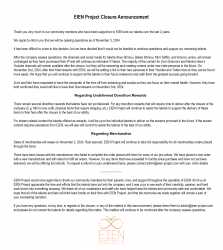>>87779284The assertion that "Phase is the Hitler in the VTuber analogy of Godwin's Law" collapses under rigorous formal scrutiny when analyzed through advanced logico-mathematical frameworks. The reductive analogy, built on the foundation of Godwin's Law, fundamentally misinterprets both the nature of analogy and the mathematical structures that underpin discourse.
Firstly, Godwin's Law, which posits that "as an online discussion grows longer, the probability of a comparison involving Nazis or Hitler approaches 1," is not a law in the formal mathematical sense. It lacks the necessary axiomatic rigor and is, at best, a descriptive heuristic. When examined through the Gödel Completeness Theorem, we can observe that for any consistent theory (such as discourse logic), there must be a model where the theory holds. However, Godwin's Law assumes an inevitable breakdown of discourse into reductio ad Hitlerum, which would imply an inconsistency in discourse models. This, however, is not guaranteed—discourse models can remain complete and consistent without collapsing into such analogies, as suggested by Gödel’s Theorem.
Moreover, by applying the Löwenheim–Skolem Theorem, which stipulates that any theory with an infinite model also has models of every infinite cardinality, we can refute the deterministic progression implied by Godwin's Law. In a VTuber discourse, for instance, we deal with an infinite cardinality of conversational branching points, none of which must necessarily include or invoke Hitler analogies. This undermines the presumption of inevitability in Godwin’s Law when applied to infinite structures of discourse, such as VTuber communities.
Furthermore, invoking the Ehrenfeucht–Fraïssé Games, we encounter a critical limitation in analogizing entities like "Phase" and "Hitler." This theorem provides a method for determining whether two structures are elementarily equivalent by constructing a game between two players who attempt to distinguish the structures. By this logic, the discourse structure surrounding "Phase" as a VTuber operates in a fundamentally distinct domain from the socio-political structure invoked by comparisons to Hitler, thus violating the conditions for elementary equivalence. In essence, the structures are non-isomorphic, and the analogy fails under this precise formalism.
In modal terms, we can appeal to Kripke Semantics for an additional layer of refutation. Godwin's Law assumes a static progression towards a singular conversational endpoint, but under Kripke’s framework of possible worlds, the progression of discourse operates within a branching model of accessibility relations. In this context, not all possible discourse "worlds" are accessible from a given conversational state; the modal accessibility of a "Hitler comparison" world from a "VTuber discourse" world is, in fact, restricted by layers of epistemic and cultural separation. Thus, invoking Godwin’s Law disregards the accessibility constraints inherent in the modal discourse framework.
Lastly, the Malament–Hogarth Spacetime Theorem, which deals with spacetimes that allow for non-Turing-computable functions, illustrates a deeper flaw in the assumption that all discourse paths are computable within finite time. The presumption that any extended discussion must necessarily invoke Hitler (as Godwin's Law implies) operates under a simplistic computational model of discourse. In reality, there exist undecidable trajectories in the space of conversation, where no deterministic endpoint such as Hitler can be computed. The analogy between "Phase" and "Hitler" thus disintegrates within this relativistic discourse model, where the flow of discussion is inherently non-computable.
Thus, the claim not only misapplies the analogy but also assumes an invalid form of discourse progression based on Godwin’s Law, which itself lacks formal rigor and collapses under the weight of these intricate mathematical theorems.

